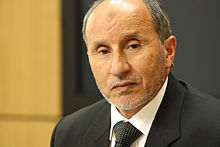Mustafa Abdul Jalil
| Mustafa Abdul Jalil مصطفى عبد الجليل |
|
|---|---|
 |
|
| Chairman of the National Transitional Council of Libya | |
|
In office 5 March 2011 – 8 August 2012 |
|
| Prime Minister |
Mahmoud Jibril Ali Tarhouni (Acting) Abdurrahim El-Keib |
| Vice President |
Abdul Hafiz Ghoga Mustafa Honi |
| Preceded by |
Muammar Gaddafi (Leader and Guide of the Revolution) Mohamed Abu Al-Quasim al-Zwai (Secretary General of General People's Congress) |
| Succeeded by | Mohammed Ali Salim (Acting President of the General National Congress) |
| Personal details | |
| Born | 1952 (age 64–65) Bayda, Libya |
| Political party | Independent |
| Alma mater | University of Libya |
| Religion | Sunni Islam |
Mustafa Abdul Jalil (Arabic: مصطفى عبد الجليل, also transcribed Abdul-Jelil, Abd-al-Jalil,Abdel-Jalil, Abdeljalil or Abdu Al Jeleil) (born 1952) is a Libyan politician who was the Chairman of the National Transitional Council from 5 March 2011 until its dissolution on 8 August 2012. This position meant he was de facto head of state during a transitional period after the fall of Muammar Gaddafi's government in the Libyan Civil War, and until the handover of power to the General National Congress.
Before the war, Abdul Jalil served as Minister of Justice (officially, the Secretary of the General People's Committee of Justice) under Colonel Muammar Gaddafi. He was noted in some news media for his stance against various human rights violations in Libya, although Diana West accused him of intransigence during the Bulgarian nurses affair.
After graduating from the department of Shari'a and Law in the Arabic Language and Islamic Studies faculty of University of Libya in 1975, Abdul Jalil was initially "assistant to the Secretary of the Public Prosecutor" in Bayda, before being appointed a judge in 1978.
Abdul Jalil was a judge "known for ruling consistently against the regime," before becoming justice minister in 2007. In January 2010 he attempted to resign on national television over the government's failure to release political prisoners. His resignation was rejected. He resigned on 21 February 2011 after being sent to Benghazi to negotiate the release of hostages taken by rebels, being the first senior official to do so.
...
Wikipedia
